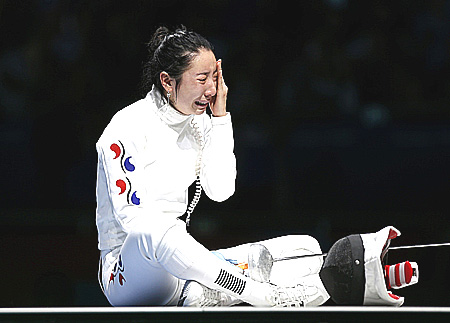One second too many

Series of blunders compromise Olympic credibility
South Korean fencer Shin A-lam probably never expected to see her dream of standing on top of the medal podium in London end in what has emerged as one of the biggest controversies of the Olympics.
Nor did she imagine herself sitting alone at the edge of the platform in floods of tears for nearly an hour instead, refusing to leave the arena.
However, all these improbabilities took place when a referee failed to read the clock properly.
“I was in a very good shape coming here,” the 25-year-old Shin said through an interpreter.
“In fact, I expected the gold medal.”
In Monday’s women’s epee semifinal between Shin and defending champion Britta Heidemann of Germany, the two were deadlocked at 5-5 with one second to go. The unheralded Korean was closer to pulling off an upset victory and advancing to the gold-medal match because she had been awarded priority under the rules.
However, the two fencers played three times for the winning point, each time with “one second” remaining indelibly on the clock.
The German was awarded a winning point on the third with a swipe attempt that surely took more than a second.
“I think it’s unfair because the one second was over,” Shin said. “I should have won, so it’s unfair.”
The decision awarding Heidemann the match prompted Shin’s coach, Shim Jae-sung, to launch a furious protest against the clock malfunction.
While officials were huddling at a table for the appeal, the heartbroken Shin stayed on the piste, upholding her right to protest. Leaving the arena would qualify as an acceptance of the decision, according to fencing rules.
Eventually, the officials rejected the appeal and came up with a ruling in favor of Heideman, which forced Olympic officials to escort the distraught Shin off the piste.
“I don’t understand how this could have happened. The one hour was really difficult for me and my feelings,” said Shin.
Shin felt sorry for the spectators, who overwhelmingly showed their support for her and gave her a standing ovation as she left the arena, saying, “They paid a lot to see matches instead of wasting their time for an hour. I feel also sorry for the people in South Korea, who have always supported me.”
Minutes later, she still had to fence in the bronze medal match, but left the arena without a medal after losing to China’s Sun Yujie 15-11 despite an early lead. Heidemann also fell to Yana Shemyakia of Ukraine in the final.
Team Korea is increasingly getting used to controversial refereeing. On the previous day, Korean judoka Cho Jun-ho was awarded a win in the quarterfinal only to have it overturned later by head of referees. Star Korean swimmer Park Tae-hwan on Saturday (KST) experienced a controversial decision that first eliminated him from the 400-meter freestyle finals and then reinstated him several hours later to compete in the finals. Park took home the silver in the event, which is his strongest race, and on Tuesday, another silver medal in 200-meter freestyle. Park will aim for the gold in 1,500-meter freestyle Sunday. <The Korea Times/Kang Seung-woo>




